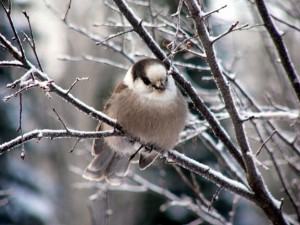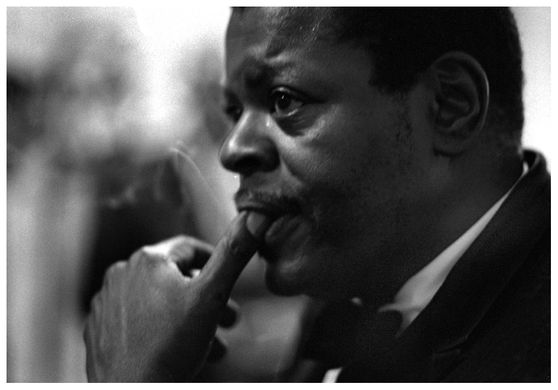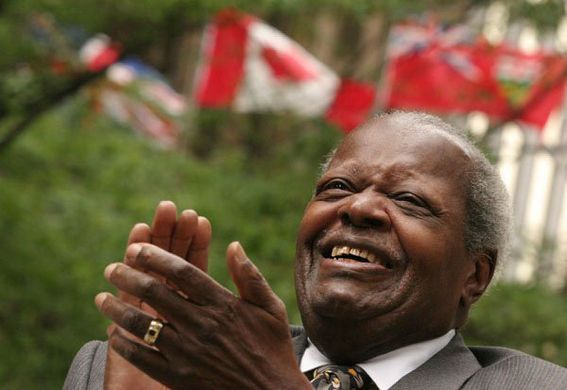18199. The Music of the Uygur Ethnic Group [We Wu Er Zu: Zhong Guo Shao Shu Min Yin
. . . . . Yue Ji Cheng]
18200. (Francis Poulenc) Sinfonietta
18201. (Cao Yurong) Ting Er Hu, Ting Di Zi: Er Hu Liu Xing Pian [erh hu works]
18202. (Benjamin Britten) Suite for Violin & Piano, Op. 6
18203. (Benjamin Britten) Elegy for Solo Viola,1930
18204. (Benjamin Britten) Sonata for Cello & Piano in C, Op. 65
18205. (Benajmin Britten) Six Metamorphoses after Ovid, for Oboe Solo, Op. 49
18206. Chun Jiang Hua Yue Ye: Min Ye Guo Cui [The Moon Night Of Spring River And
. . . . . Flowers and Other Fujianese Classics]
Read more »
Category Archives: CS - Listening 2008 - Page 6
First-time listening for February 2008
Bird Songs of Eastern and Central North America
I love Goodwill stores. Where else are you going to find a vinyl pressing of Bruce Willis’ rock band, or a biography of Telly Savalas? And you occasionally find something that’s actually valuable or useful. Yesterday, I paid fifty cents for a two-disk recording of the calls of about three hundred birds of my region, keyed to the page numbers of Peterson’s Field Guide, the bible of birding on this continent. I was surprised at the number of calls that I recognized. But I was disappointed to find the Whiskeyjack (Wiisagejaak, in Cree) missing. How could they ignore the impudent trickster? It’s distinctive song is usually described as “whee-ah, chuck chuck”. It also whistles and screeches on occasion, or sings a charming “whisper song” when mating.
[Photo of a Whiskeyjack taken by Aarre Ertolahti in Lappe, fifteen miles west of Thunder Bay. Originally published in Canadian Sanomat, a Finnish-language newspaper in Northern Ontario.]
Pushing Up Daisies
Not to be confused with the Salt Lake City band of the same name, this Canadian band put out two albums of fairly decent alt-rock before they broke up. I have vague memories of an enjoyable evening at some club (in Montreal?) which is confirmed by the fact that my tape of their first album, Wheedle, is signed by all the band members. I must have bought it from them.
Alan Tam
Alan Tam [谭咏麟] was, along with Leslie Cheung, a big name in Hong Kong cantopop during the 1980s. All I have is a cassette made in HK, with no English on it. The songs are all “laid-back” ballads that would satisfy any Perry Como or Barry White fan. The ones I like best on the tape are “水中花” and “擁抱”, strictly on the basis of the smoothness of the singing. Not for anyone who has a low threshold for mush.
Throbbing Johnson
Listening to A Taste of Throbbing Johnson, an amateurishly produced indie tape that I somehow acquired in 1999 or 2000. Just the bare tape in a blank case, so no names to go on. It has a mildly amusing audio skit at the end. A total mystery… someone must have given me the cassette, perhaps a street busker or someone I met in a club, but I can’t remember who or under what circumstances. I accumulate a lot of music that way, which tells you something about my life. No trace of the band anywhere on the web. It’s not bad music, tho.
Tones On Tail
This lineup of Daniel Ash, Kevin Haskins and Glenn Campling was an ephemeral intermediate stage between Bauhaus and Love And Rockets. The Album Pop (1984), which I have only in a poor quality copy, was one of two cassette-only configurations of songs taken from seven and twelve inch vinyl singles. The songs are moody and surrealistic, quite interesting, and very similar to the fine work that subsequently appeared on Love and Rockets’ Seventh Dream of Teenage Heaven. I have no idea where you could find this particular item, but the 1998 CD compilation Everything! must contain the same tracks.
Underworld.. satisfying techno from the nineties
This is an interesting British techno group from the 1990’s. Dubnobasswithmyheadman (first album, 1994) makes me want to step into my time machine and visit the London clubs around that time. Most of the club stuff from that era hasn’t worn well ― listening to the average Chris Sheppard compilation can be pretty painful. But Karl Hyde (vocals), Rick Smith and Darren Emerson made a creative mélange of techno-house-dub-funk that can still be played without embarrassment. The vocals actually fit in to the mix, rather than simply being a kind of hallelujah chorus thrown in so you can remember which set you’re listening to. But the strongest element is its progression, the necessary build-up of emotion, in this case starting with harsh cynicism (“Dark and Long”) through contemplative (“Mmmm Skyscraper I Love You”), recharging (“Spoonman”) and climax (“Cowgirl”). This must have made for one of those deliriously satisfying dance floor experiences that the club scene was all about. I have a different mix of “Dark and Long” labeled “Dark Train Mix” on the entertaining compilation UK Tribal Gathering ’95.
The second album, Second Toughest In the Infants (1996) shifts to what came to be called “Progressive House”, influenced by the multi-layered art-rock of the seventies, but retaining the danceable techno beat. There are audible hints of Yes and Genesis. As in the first album, many of the songs are dark and moody. The re-release of this album includes a bonus track of “Born Slippy .NUXX”, which had widespread exposure through the film Trainspotting. I also have “2 Months Off [King Unique Sunspots Vocal Mix]” and “King Of Snake [Fatboy Slim Remix]” on two different Sheppard collections. These songs appear on later albums, which I’ve never heard.
First-time listening for January 2008
18062. (Oscar Peterson) A Tribute to Oscar Peterson Live at Town Hall [with Neils-Henning
. . . . . Ørsted Pederson, Ray Brown, Herb Ellis, Benny Green, Roy Hargrove, Shirley Horn,
. . . . . Milt Jackson, Lewis Nash, Clark Terry, Stanley Turrentine, Manhattan Transfer]
18063. (Oscar Peterson & Ben Webster) Ben Webster Meets Oscar Peterson [with Ray Brown
. . . . . and Ed Thigpen]
18064. (Oscar Peterson) A 75th Birthday Celebration [Canadian exclusive release]
18065. (John Blow) Ode on the Death of Mr. Henry Purcell
18066. (Henry Purcell) “Why should men quarrel?”
Read more »
Envoie for Oscar Peterson, (August 15, 1925- December 23, 2007)
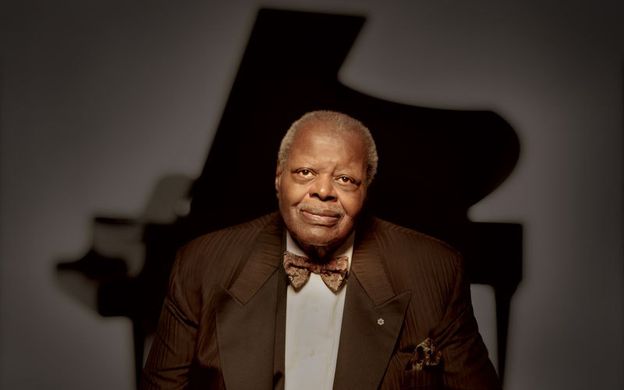 Christmas in Canada was saddened by the death of Oscar Peterson, who is acknowledged by many as one of the greatest of our countrymen. During his immensely productive lifetime, Oscar exemplified everything that Canadians tend to admire: calm, equilibrium, gentle good humour, an inate and effortless democracy, a complete lack of pomposity and chest-beating, combined with a delight in life and pleasure, and an exact precision in execution. Every flash of fingers on the keyboard was like a Gretsky goal. In other words, he was the complete opposite of what modern consumer culture elevates as virtues. As long as we had him with us, perhaps, we could not be entirely corrupted.
Christmas in Canada was saddened by the death of Oscar Peterson, who is acknowledged by many as one of the greatest of our countrymen. During his immensely productive lifetime, Oscar exemplified everything that Canadians tend to admire: calm, equilibrium, gentle good humour, an inate and effortless democracy, a complete lack of pomposity and chest-beating, combined with a delight in life and pleasure, and an exact precision in execution. Every flash of fingers on the keyboard was like a Gretsky goal. In other words, he was the complete opposite of what modern consumer culture elevates as virtues. As long as we had him with us, perhaps, we could not be entirely corrupted.
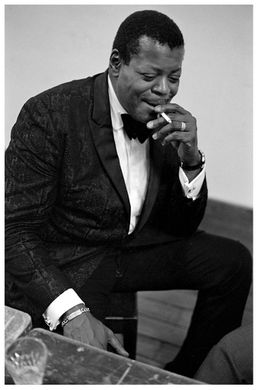 The son of a Canadian Pacific Railway porter, Peterson grew up in the Little Burgundy neighbourhood of Montreal. It was a predominantly black neighbourhood that was filled with music, both classical and jazz. His musical family encouraged him in a classical training, and he studied with Paul de Marky, a student of Franz Liszt. He was psychologically a perfectionist, and practiced four to six hours a day, even in early childhood. By the age of fourteen, his astonishing virtuosity had led him to win a national radio competition. His strongest influences included Art Tatum, Bach, Rachmaninov, Nat “King” Cole, Teddy Wilson, and, most notably, his own sister, a music teacher who nurtured several Canadian jazz stars. He was at his greatest strength in trios, an artform which he perfected with the Ray Brown and Herb Ellis, with Ray Brown and Charlie Smith, and with virtuoso guitarist Joe Pass and Niels-Henning Ørsted Pedersen on bass.
The son of a Canadian Pacific Railway porter, Peterson grew up in the Little Burgundy neighbourhood of Montreal. It was a predominantly black neighbourhood that was filled with music, both classical and jazz. His musical family encouraged him in a classical training, and he studied with Paul de Marky, a student of Franz Liszt. He was psychologically a perfectionist, and practiced four to six hours a day, even in early childhood. By the age of fourteen, his astonishing virtuosity had led him to win a national radio competition. His strongest influences included Art Tatum, Bach, Rachmaninov, Nat “King” Cole, Teddy Wilson, and, most notably, his own sister, a music teacher who nurtured several Canadian jazz stars. He was at his greatest strength in trios, an artform which he perfected with the Ray Brown and Herb Ellis, with Ray Brown and Charlie Smith, and with virtuoso guitarist Joe Pass and Niels-Henning Ørsted Pedersen on bass.
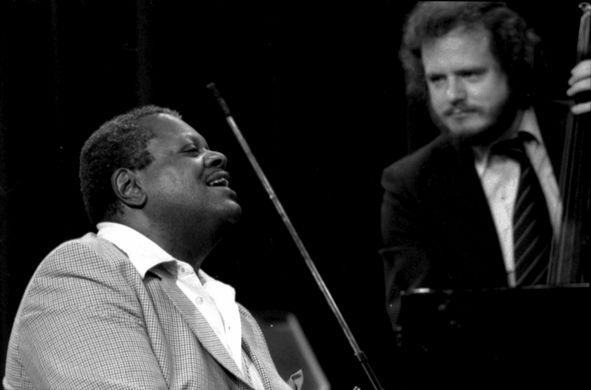 Peterson’s modest decorum, always part of his particular charm, was exemplified when he was offered the position of Lieutenant Governor of Ontario (in Canada, this position, not the Premiership, is the political Head of State). Prime Minister Jean Chrétien, a lifelong friend, was the instigator of this tribute, but Peterson turned it down. But Chrétien did manage to orchestrate a highly emotional meeting between Peterson and Nelson Mandela. His last years, despite ill-health, were concentrated on teaching. He always insisted that jazz pianists should master Bach as part of their basic training.
Peterson’s modest decorum, always part of his particular charm, was exemplified when he was offered the position of Lieutenant Governor of Ontario (in Canada, this position, not the Premiership, is the political Head of State). Prime Minister Jean Chrétien, a lifelong friend, was the instigator of this tribute, but Peterson turned it down. But Chrétien did manage to orchestrate a highly emotional meeting between Peterson and Nelson Mandela. His last years, despite ill-health, were concentrated on teaching. He always insisted that jazz pianists should master Bach as part of their basic training.
